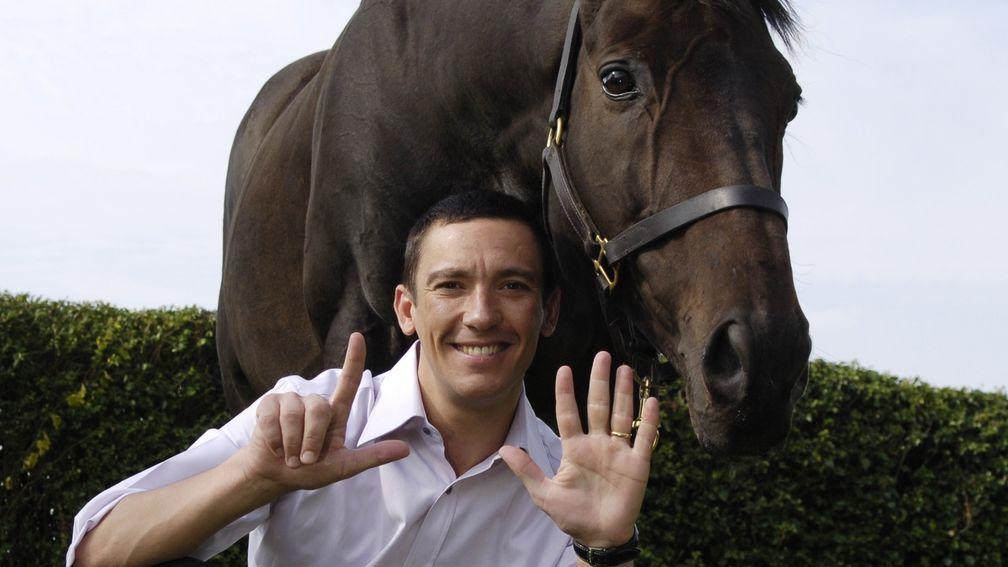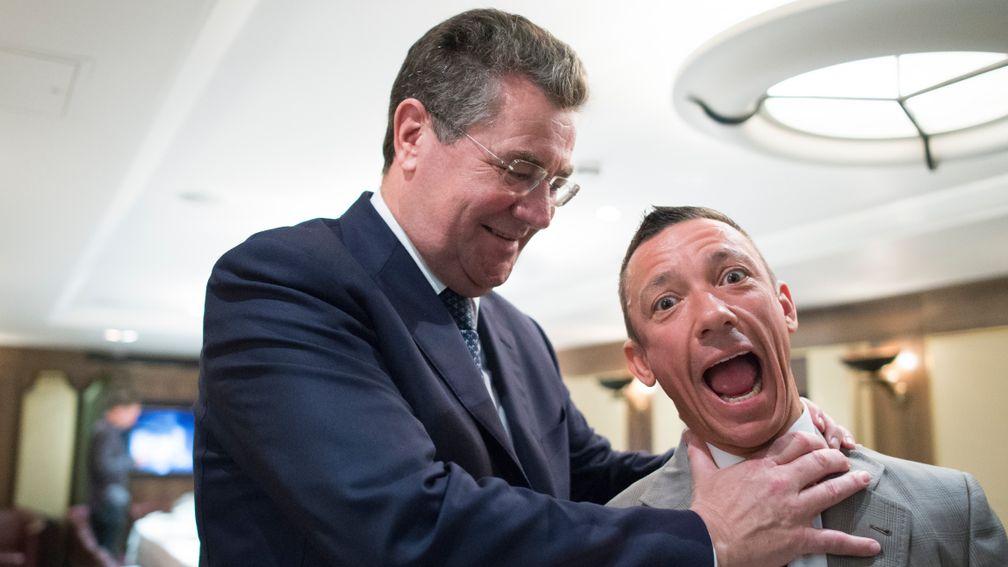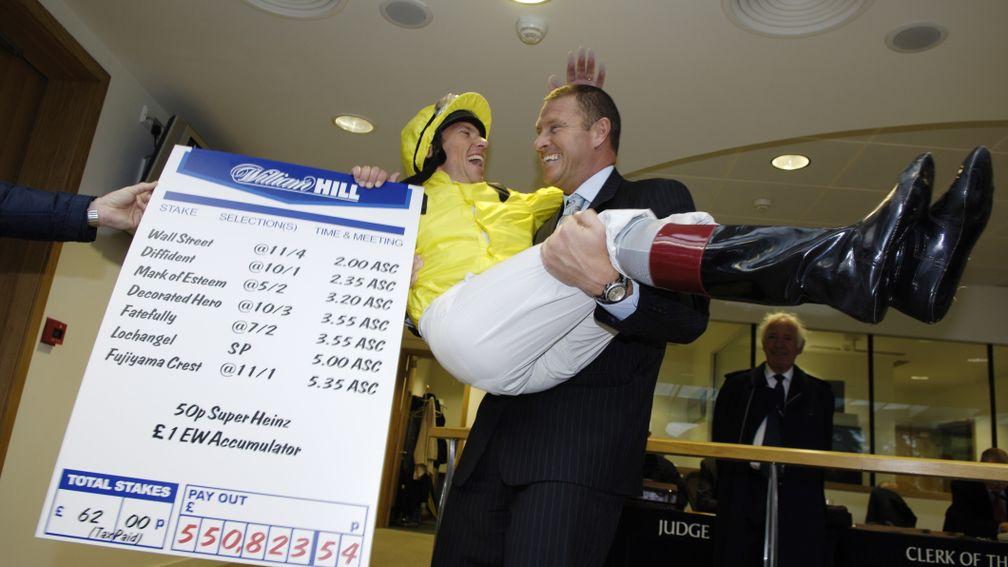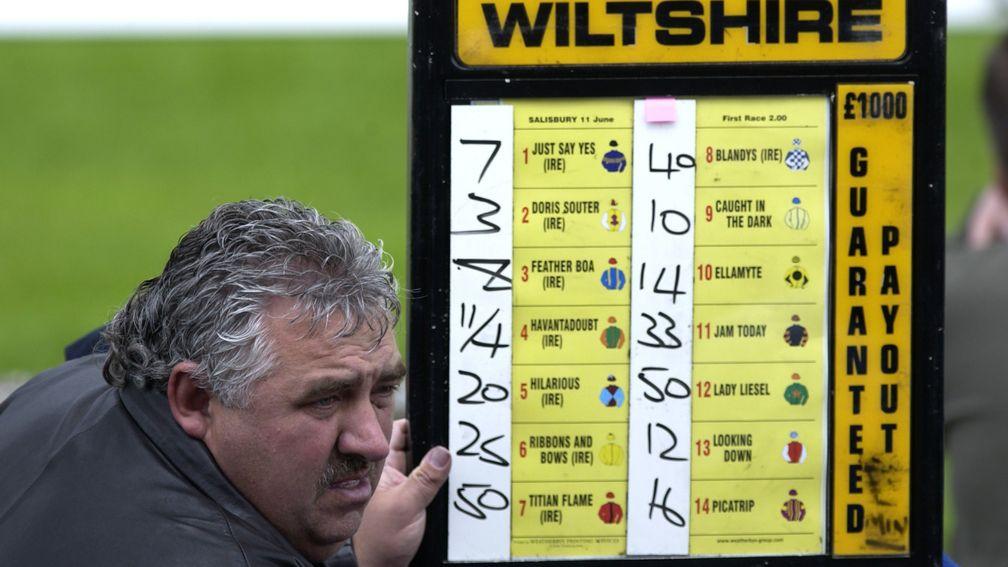Frankie's Magnificent Seven: 'The losses were horrendous - but it catapulted racing to a different place'

Frankie Dettori's most famous day in racing occurred at Ascot on September 28, 1996, when he went through the seven-race card, costing bookmakers a fortune and making sure 'mug punters' could never be taken lightly again.
This article was first published in August 2020 and is available to read on the anniversary of Dettori's incredible feat and on the eve of his final ride in the Prix de l'Arc de Triomphe, in which he is chasing a record-extending seventh victory.
In any walk of life, there are game-changers, and then there are game-changers. There are people who have the ability to send tremors through their chosen field, and then there are people whose stature and reputation can quickly turn those tremors seismic, until they rattle the living-room windows of the world beyond. In sport it's no different, but in the world of racing, if anybody is going to become ground zero for an earth-trembling event, it's going to be Frankie Dettori.
Lester Piggott was always the 'housewives' favourite', and to the extent that anybody moved markets in the pre-digital age, he moved them, especially on the first Wednesday in June at Epsom throughout the 1970s. However, with the advent of celebrity culture the possibilities for a mass happening in the off-course arena rippled outwards into a realm where disaster for the layers was always a looming spectre.
This was a time of growth for the gambling industry, when the seediness of the backstreet betting shop was being scrubbed clean by legislation and social change. Tea, coffee and live pictures had been legalised in bookies' parlours in 1986; the advent of the National Lottery in 1994 had lent a new veneer of respectability to gambling; the once-a-year housewife was being replaced by the recreational punter, who loved a flutter on the horses.
It was against this freshly painted backdrop that Dettori was beginning to perform his magic on the betting public, who had taken his cheeky antics to their hearts. The flamboyant 26-year-old had become the focus of the bulk of the 'mug bets' most Saturdays through the Flat season, and the time was ripe for the major layers to have the wind put well and truly up them.
That wind blew on September 28, 1996 at Ascot's Queen Elizabeth II Stakes meeting, where Dettori had seven rides that, while having a look of promise about them, hardly struck fear into shop managers' hearts.
In the morning, their combined odds amounted to an accumulator paying in the region of £236,000 to a £1 stake; come the final reckoning, the SP 'acca' weighed in at a shrunken 25,000-1, roughly £40 million had been liberated from the tills of the high-street firms and trading managers countrywide were mournfully sifting through the wreckage.
Not that everybody in the bookmaking business viewed the losses as catastrophic. Mike Dillon, Ladbrokes' 'boots on the ground' back in the day, had a ringside view of the action at Ascot, saw the media storm brew and break that evening, and went into the office on Monday with a not-entirely-welcome message of positivity.
"There was a lot of weeping and gnashing of teeth, but I took a completely different view of it," recalls the doyen of the bookies' PR ranks. "I thought it was the best thing that happened to the industry for years.
"Obviously there was a lot of mayhem in the office, but I jokingly said to them that they should put the losses in the marketing budget, not the trading budget, because in terms of getting on the news and the front page of all the Sunday papers, and all the resultant publicity, it brought the sport to a completely new level. If it cost the industry £40 million, it was an investment rather than expenditure.

"Not everybody saw it that way, and I can see why, because the losses were pretty horrendous, but it catapulted racing to a different place. It had been in neutral. The game was the game and it was going nowhere. Then all of a sudden he [Dettori] was on breakfast television on Monday morning, it went on for weeks and weeks, and the profile it brought to the racing industry was phenomenal."
Begging to differ on this point were the company accountants left to count the dwindling supply of beans in betting shops nationwide, along with those on-course layers who were washed away in the tsunami. Many couldn't resist the potential for serious enrichment that had been created by this unforeseen set of circumstances, with the first six winners causing the kind of havoc not seen before or since.
Dettori had been half expected to have a couple of winners, and three or four wasn't considered beyond the realms of possibility, but when Wall Street was followed by Diffident, who was followed in turn by Mark Of Esteem, with Decorated Hero, Lochangel and Fatefully all dragged to victory by the gathering momentum, the ring was sent into meltdown. The seventh horse, Fujiyama Crest, had been available to back at 20-1 in the morning, so when the opportunity arose to lay him at a tenth of those odds, many couldn't resist.
"You couldn't blame them," insists Dillon, "because if you've got a horse that's 14-1 at three o'clock and there isn't a penny for it, and then there are hundreds of thousands for it at 2-1, what are you going to do? It's a no-brainer. You're going to lay it for all you're worth."
With the off-course firms shovelling money into the ring like there was no tomorrow – which for many of them looked a distinct possibility – and the men on the rails prepared to stand Fujiyama Crest for a king's ransom, a stand-off of epic proportions developed. But the price held up at 2-1 and the SP, albeit at a tenth of the early price, promised even greater carnage for those whose liabilities had suddenly taken on unknowable proportions.
"I was on the course and away from it," recalls Dillon, "but I know our trading director was shovelling money on as fast as he could. However, nobody could get enough on to make the difference. They'd have been kept informed of ongoing liabilities, the shops would have been ringing in and telling them, but there was blind panic everywhere."
It had all started off so innocently. Dettori spoke later of a normal morning, looking forward to a few nice rides, in particular Mark Of Esteem in the day's big heat, the Queen Elizabeth II Stakes. He'd probably have been disappointed not to leave with a winner in the bag, but there was no thought of major multiples.
Up in the north-west, Betfred boss Fred Done had come home from work at midday to enjoy a restorative bowl of soup and a lie on the bed in front of the telly. Legend doesn't specify the flavour of the soup, but it's a safe bet that by the time he'd finished it, he was suffering from a bad case of indigestion.
"I got a phone call," he said. "I was told we'd laid £20,000 in one single bet at 7-2 [about Mark Of Esteem in the third race] and 'Dettori's rode the first two winners and if it wins it'll be no good in multiples'.
"Then, for the first time in 20 years, I get a phone call: 'Can you come back to the office? It's getting a bit out of hand.' So I knew it must be hot, and the phones were ringing off the hook. We had about 200 shops but all the lines were blocked . . . then the fourth one wins, and the fifth . . . the shops couldn't get through and I don't think even they knew what their liabilities were. You're trying to stay calm in front of the staff . . . then the sixth one wins and now we're really in it and you can't cover."
It was around this point that, with the off-course layers going into meltdown, the on-course layers spotted their chance. With 'shop money' flooding on to the track, Fujiyama Crest was in freefall in the ring. What had been around a 16-1 shot in the morning was now well into single figures and money-making instinct kicked in.

Dettori himself confessed he hadn't given the Sir Michael Stoute-trained four-year-old much of a chance at the start of proceedings, but when he gunned his mount out of the stalls and set out to make almost every yard in the Gordon Carter Handicap, the intent was plain to see and the bookies began to sweat.
"Frankie is Mr Racing to some people and they'll back him blind whether he's on Pegasus or the pack horse," shrugs Dillon, "so it was always going to be a problem from midway through the afternoon."
Heading into the final furlong, Fujiyama Crest was low on fuel and Pat Eddery was closing him down on Northern Fleet, but Eddery was running out of yardage, and with Dettori in such undeniable form, he managed to coax just enough out of the leader to get him home by a neck. Blood curdled in the veins of a thousand layers. Some went to the wall; others tried to make the best of a very, very bad job.
Done had all his shop managers phone in with their liabilities and told them to pay out what they could. "We had another £2.5 million to pay on Monday," he remembers, also recalling a characteristic piece of marketing. "We sent the video of all seven winners to all winning customers over £10,000, with a bottle of champagne and a box of cigars. I put up a photograph of Frankie Dettori with the caption 'Last seen in the Ascot area, reward, dead or alive, I don't care which'."
Ladbrokes stopped short of putting a price on Dettori's head, but Dillon encouraged the money men to put a positive spin on the losses.
"It was a massive losing weekend but we had to salvage something from the ruins," he explains. "I got on to Frankie and asked him to do a few cheque presentations for us and I kept on saying that it was a real opportunity to promote the business, although not everybody was in the mood."
The major bookies spent a long time licking their wounds as the £40m losses leached from their accounts and their worth on the stock market plummeted. There were questions to be asked. What could we have done differently? How can we stop it happening again? Ultimately it was the Frankie Factor that did for them – the weight of public money – but what lessons should be learned?
"I think it made them more aware of things that could happen," reflects Dillon. "When nobody's ridden seven winners in a day before, you think quite logically that it's never going to happen and you can take that kind of bet all day, so I think it made people look at their processes and systems, in terms of realising what your liabilities could be.
"It didn't necessarily change any bookmaking principles but it woke people up to the possibilities of a situation like that."
Some, however, were less awake than others, and when Dettori came within a whisker of repeating the dose at Royal Ascot last year, many must have had unpleasant flashbacks. As it happened, the rampant Italian racked up four winners but was denied a horribly expensive fifth when the front-running Turgenev was overhauled late in the Britannia Handicap, yet the scare was enough to remind everybody that lightning stood a very real chance of striking twice.
"With these horses, their prices in the morning will reflect their chances," says Coral odds-compiler James Knight, "and it won't be as though they're 33-1 chances that should be odds-on – it's not like Barney Curley in that respect. But because of the multiples we take, we can build up a liability that's just too big. So in the same way Curley changed the way a firm might operate in accepting those potentially huge payout multiples, Frankie last year brought about another change of approach.
"It's a bit like airline safety – you have these near-misses. We took another big hit but it could have been catastrophic and wiped out a few firms if the fifth one had won. So every time you have that kind of incident, you have a review and ask how we can mitigate against that happening. The answer is that you can't completely eliminate the risk but there are things you can do to reduce the chance of getting caught out, or at least to reduce the liabilities."
Some firms even resorted to refusing to take multiples on Dettori's horses the following day, thus protecting their bank balances but at some cost to their reputations. Dillon, as befits a man of the old school, has nothing but scorn for such an approach.
"It reflected very badly," he says. "The whole betting industry has been built on taking that sort of bet. The big betting companies spend years and years encouraging people to back multiples, then when one clicks, to say we don't want them anymore seems very short-sighted.
"Days like that have to be treated carefully and an afternoon like the Magnificent Seven may have cost bookies a lot of money, but I still believe 100 per cent it was good for racing. We were lucky that somebody like Frankie did it. Had it been Lester, we wouldn't have got a tenth of the publicity – and we're still living off it now."

'I thought this was my chance to be a millionaire'
Gary Wiltshire had been on his way to a jumps meeting at Worcester on that fateful morning in September, when a traffic jam on the M40 forced him to reroute to Ascot. Through one small quirk of fate, he went from being a contented, low-key layer to being caught up in the biggest single incidence of carnage ever seen in a British betting ring.
"I was still winning after five races because I was only playing small," he said afterwards, "and all of a sudden the sixth one won and I thought to myself, 'Hang on a minute, there's a chance for you here.' Don't forget I was only a market trader, selling flowers in Leather Lane market, and I thought this was my chance to be a millionaire. I'm not kidding, it felt fantastic.
"The first bet I laid was £40,000 at 4-1. That's a £160,000 loss and I had two grand in my pocket. Once I took the first bet I got carried away and went on and on and on. As far as I was concerned, it was a licence to print money.
"My clerk said: 'Do you know what you're doing?' I never knew, really, and by the end of it I had a loser for £1.4 million.
"Everybody said I was the villain of racing: all the big boys said if it wasn't for me standing up against Fujiyama Crest, the SP would have been evens instead of 2-1 and it would have saved the industry millions, but I did every penny I had. My house went, my cars went, it took me four years to pay it back."
Read these next:
Ryan Moore: a fascinating insight into the mind of one of the world's greatest jockeys
Mick and Peter Easterby: 'When we punted one it usually won and others would follow us in'

Subscribe to Racing Post Members' Club Ultimate Monthly and pay just £9.99 per month for your first two months!
Available to new subscribers purchasing Ultimate Monthly using code SUMMER. First two payments charged at £9.99, renews at full monthly price thereafter. To cancel please contact us at least seven days before subscription is due to renew. Offer expires 30/09/2023.
Published on inFeatures
Last updated
- Top racing books of 2024: must-reads of the year, from the perfect Christmas stocking filler to a pioneering jockey
- Captain Marvel: how a modern master of Cheltenham and a genuine pioneer executed one of the shocks of the year
- 'We’re delighted with how it's going' - joint-trainers prepare for exciting year after Flat string is doubled
- 'We’ve had to work hard this sales season' - Kennet Valley seeking to build on success with biggest string
- Alastair Down's archives: the great writer recalls Coneygree's glorious victory in the 2015 Cheltenham Gold Cup
- Top racing books of 2024: must-reads of the year, from the perfect Christmas stocking filler to a pioneering jockey
- Captain Marvel: how a modern master of Cheltenham and a genuine pioneer executed one of the shocks of the year
- 'We’re delighted with how it's going' - joint-trainers prepare for exciting year after Flat string is doubled
- 'We’ve had to work hard this sales season' - Kennet Valley seeking to build on success with biggest string
- Alastair Down's archives: the great writer recalls Coneygree's glorious victory in the 2015 Cheltenham Gold Cup
